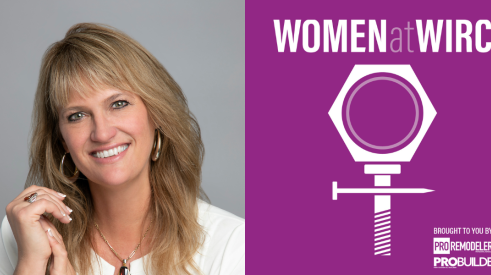I’ve been the CEO of Harrell Remodeling since 2014. Our 2017 revenue was over $8.5 million, and we’re projecting $10.5 million for 2018.
There are a lot of things that set Harrell apart from many remodeling companies, but one of the biggest is that our sales team is paid a straight salary with no commission. After a failed attempt at paying commission early on, our founder, Iris Harrell, started doing it this way in the ‘90s, and it’s worked really well for us ever since. I’ve been with the company for 22 years and have seen the success of this system firsthand. It accounts for the support a salesperson gets from Marketing, CAD, Estimating, Procurement, Project Managers, Carpenters, and, of course, our Accounting and Admin Team.
When I tell other builders that our salespeople don’t earn commission, I usually hear the same objections, since the idea of no commission runs counter to what we’re taught about business. These objections make sense in some companies, but for us, a salary-only model actually creates a happier, better-aligned team. Here are some questions that people ask:
If there’s no commission, what motivates your salespeople?
Our model is based on designers who also sell, and I don’t think they fit the typical salesperson model. They are heavily vested in the design itself, and much of their job satisfaction comes from that creative process. We have salespeople who have told me, “The only reason I sell is so that I can design.”
One of our top salespeople used to work in a cabinet showroom, and experienced some of the drawbacks of a commission-based system. These include instances of people stealing opportunities from a coworker because they happened to be there when a client came in; unpredictable swings in earnings potential; getting lousy shifts; and not having latitude in how a contract is developed and priced. She came to work for us and says she is much happier today.
Will salespeople upsell if it doesn’t benefit them financially?
Our team members are realistic about clients’ budgets. They see themselves as an advocate for the homeowner, and as such, their goal is to meet the clients’ needs rather than get the highest ticket possible. Our designers still want to achieve their sales targets and will compete with themselves or others on the team in a friendly way, but they won’t try to get there by upselling on a job. Instead, they will work on getting another client.
So, how are they motivated to sell?
We are an employee-owned company which creates a different culture overall. Quite often our salespeople are motivated by a possible impending lack of work on the production side. If the calendar has holes in it, a salesperson might think, “I can split this project off and keep the production team busy.” It’s a little more of a hassle, but because we’re an ESOP, there’s a larger consciousness toward looking out for the rest of the team, and overall, the whole team wins.
Do you have a hard time hiring?
We realize this model may make some people reluctant to come work for us. But we are not looking for those superstar individual performers you often see in sales, but rather, those who see the value of working for the benefit of the team. We know from experience that people who aren’t team-oriented generally don’t work out. Either they recognize that it’s not a good fit, or we see it in the interview and don’t hire them.
How do you handle raises? Do you just give cost of living increases?
We provide cost of living increases, but when we do, the salary ranges for every role in the company go up accordingly at the same time. Many years ago we also had a system that was tied each individual employee’s performance in a single year. If someone had a good year, they got an increase. If they had a bad year, they didn’t. It wasn’t a commission per se, but it was like a penalty if they didn’t make their goal and a reward if they did. I wanted to get away from a short-sighted, merit-based system where some could end up being paid significantly higher than others who overall were performing the same role. I changed that structure awhile back to one that I think is better for our company. Our goal is to provide an above-average salary and benefits for each person on our team.
We first determine what a reasonable rate of pay is—we look at salary studies, data from peers in similar markets, and numbers from the Bureau of Labor Statistics to establish a salary range for each role. On top of that, we offer incentives across the board through a profit-sharing system. We are an employee-owned company, but you can do this even if you are not.
I don’t want to come off as saying we have all the answers, because we occasionally still have to have hard conversations about performance and compensation fairness. But I take pride in the fact that our team knows that Harrell Remodeling’s mission is to serve clients and our employee owners simultaneously. This helps us work together in a highly collaborative way, and I believe our salary and benefits programs reward us for that
Add new comment
Related Stories
4 Steps to Prep Your Business for Contraction
How a remodeling company plans ahead for the worst of times (and the best of times)
Creating a Company Fire Drill: How to Prepare for the Worst
A disastrous fire could have been a lot worse if the business wasn’t prepared for the unexpected
The Fundamentals of Growing Profitably
On this episode of Women at WIRC podcast, Nip Tuck Remodeling Owner April Bettinger shares how she plans for her company's profitable growth
3 Things to Add to Your Construction Contract—From a Lawyer
Did you know you can add these three elements to your contracts?
Study Finds Remodelers’ Net Profits Declined
How far did net profits decline and what's influencing the drop?
The Home Depot Bets on Pros Amid Predictions of Flat Sales Growth
For the first time since 2019, The Home Depot’s revenue fell short of Wall Street’s predictions amid a general softening in the home improvement market
Indicators of a Softening Market and How to Prepare
Market conditions could be changing, but don't panic. Richardson shares ways to stay on top of market conditions and how to prepare for any potential softening down the road.
Grow Your Business Through Collaboration with Remodeling Peers
Remodeling Mastery Forums offers a unique business opportuniy for remodelers













